Why Use Computers to Keep Records?
Even if you don't work for a huge business, It can be useful to use computers to keep track of data.
Data that is stored on a computer (as opposed to data written on paper) can be easily:
Data that is stored on a computer (as opposed to data written on paper) can be easily:
- organised / sorted in different ways
- displayed / printed in a variety of styles and layouts
- searched for specific things
- updated - adding / changing / deleting items
- backed-up - a copy can be made with just a few clicks
- stored / moved - a memory stick is much smaller than a cupboard full of paper!
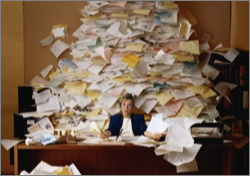
Computerised databases can help organise even the most disorganised person!
What Might You Store on a Computer?
Your Address Book
Most people need to keep track of lots of telephone numbers, postal addresses, e-mail address, etc.
We can use a computer (don't forget your phone is a computer too!) to help keep this data organised in an address database.
A typical computerised address book might store:
We can use a computer (don't forget your phone is a computer too!) to help keep this data organised in an address database.
A typical computerised address book might store:
- Name
- Address
- Phone number (home)
- Phone number (mobile)
- Phone number (work)
- E-mail address
- Birthday
- Photograph
- Etc.
- Place your entries into groups (e.g. 'Family', Friends', 'Work', etc.)
- Search (by name, groups, address, etc.)
- Synchronisation with other devices (computer, phone, PDA, etc.)
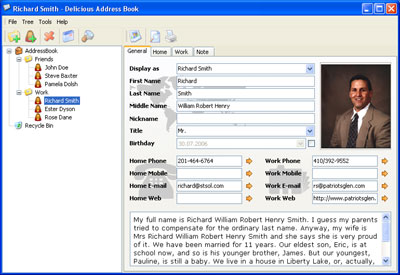
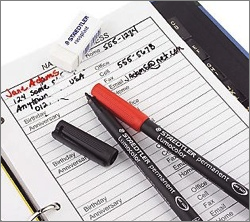
A few years ago, before we had PCs and mobile phones to tore this information in, most people would have used a little address book.
However, this type of book was easy to lose (no back-up), a pain to update (you have to cross out names, tear out pages, etc.) and slow to search through.
However, this type of book was easy to lose (no back-up), a pain to update (you have to cross out names, tear out pages, etc.) and slow to search through.
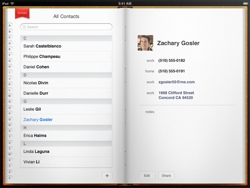
An electronic address book is much easier to keep up to date!
Club / Society Records
Clubs / societies need to keep track of their members. A membership database allows the club / society to easily contact members, check that they have paid any fees, etc.
A typical computerised membership database might store:
A mail-merge is a very easy way to automatically create lots of letters that seem to be personally written for each person, but in fact are all the same letter, just with the name and address changed.
A typical computerised membership database might store:
- Membership number
- Name
- Address
- Phone number
- Fees to charge
- Have fees been paid (Y/N)
- Etc.
A mail-merge is a very easy way to automatically create lots of letters that seem to be personally written for each person, but in fact are all the same letter, just with the name and address changed.
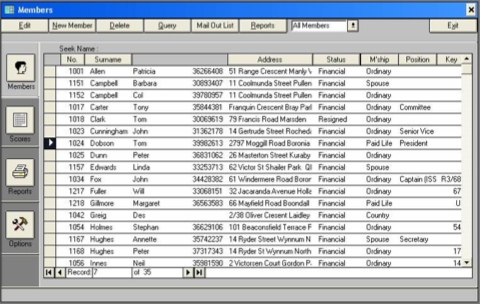
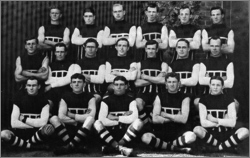
If this was your football club, you'd want to know a few facts about your club members. Using a computer to keep hold of their details is much easier than using paper.
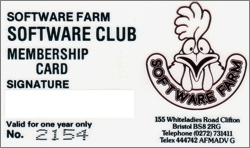
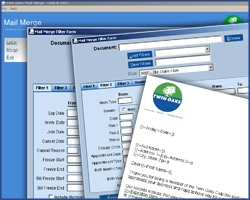
Results of Surveys
Many groups / organisations undertake surveys to try to discover what people like / want / think.
Surveys can be performed using paper questionnaires, and then the results entered into the computer by:
The survey results are best stored on a computer so that they can easily be analysed. Survey results on a computer allow:
Surveys can be performed using paper questionnaires, and then the results entered into the computer by:
- Typing data in
- Scanning the paper forms, using OMR technology
The survey results are best stored on a computer so that they can easily be analysed. Survey results on a computer allow:
- Data to be quickly and easily queried (filtered)
- Charts to be easily created
- Summary reports to be created
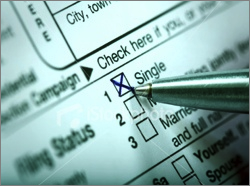
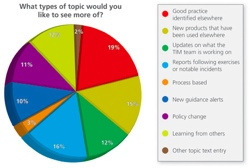
Sales Records for a Tuck Shop
It's important, when selling things, and dealing with cash, to keep track of the numbers involved.
A computer spreadsheet is an good way to record which items you have sold, and also to perform calculations on the data (calculate totals, averages, etc.).
A typical sales spreadsheet might contain the following columns:
A computer spreadsheet is an good way to record which items you have sold, and also to perform calculations on the data (calculate totals, averages, etc.).
A typical sales spreadsheet might contain the following columns:
- Item code
- Item description
- Item cost
- Number sold
- Total cost
- Profit made
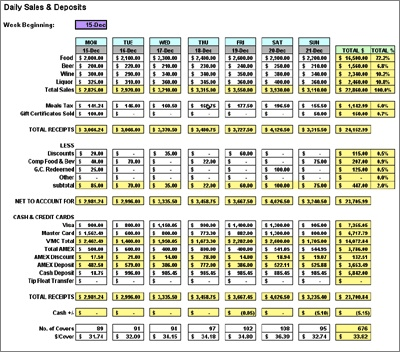

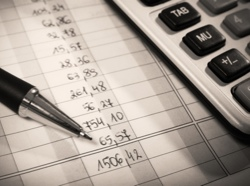
Doing calculations manually can lead to mistakes. When money is involved, it's best to let a computer do the work!
School Reports
A school would typically keep data on student academic performance in a computerised database. This would allow the school to easily track how students were doing as the year progressed, as well as making the creation of printed reports very easy (compared to hand writing every report)
A typical school report database might contain:
(For a full discussion of school databases, see the School Management Systems page)
A typical school report database might contain:
- Student ID
- Name
- Tutor group
- Grades for Term 1
- Attendance for Term 1
- Comments by teachers for Term 1
- Grades for Term 2
- Etc.
(For a full discussion of school databases, see the School Management Systems page)
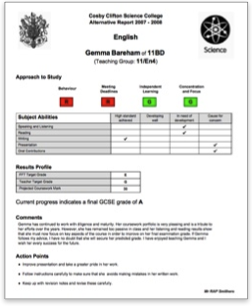
You might think that your report is written just for you, but often this is not entirely true...
Many school reporting systems allow teachers to select pre-written comments from a 'comment bank'. So those 'personal' comments on your report are actually from a database - they were just the comments that best matched you!
Many school reporting systems allow teachers to select pre-written comments from a 'comment bank'. So those 'personal' comments on your report are actually from a database - they were just the comments that best matched you!
School Library Database
Even a small library, such as the one in a school, needs to keep track of which books are available, and who has borrowed any of them.
A typical school library system would store the following information:
A typical school library system would store the following information:
Books
- ID number
- Title
- Author
- Publisher
- Fiction? (Y/N)
- Genre
Loans
- Book ID
- Borrower ID
- Date borrowed
- Returned? (Y/N)
Borrowers
- ID number
- Name
- Class
- Date of birth
- Fines to pay
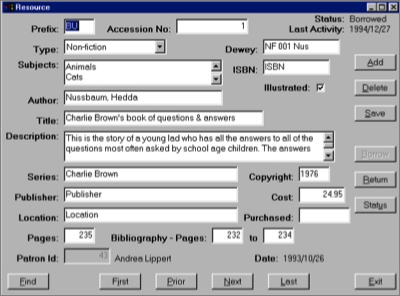
(For a more detailed description of library databases, see the Library Systems page)

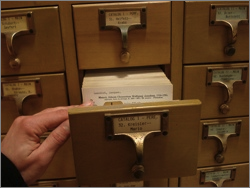
Before the use of computers, libraries used drawers full of little cards to keep track of library books. The system was hard to mange, and cards could easily get lost or mixed up.
surveys, address lists, tuck shop records, clubs and society records, school reports and school libraries
